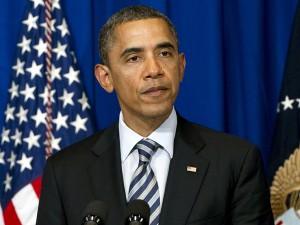
President Barack Obama announces that US Secretary of State Hillary Clinton will travel next month to Myanmar to discuss renewing US dialogue with the country, during a statement on the sidelines of the Association of Southeast Asian Nations and East Asia summits in Nusa Dua on Indonesia's resort island of Bali on November 18, 2011. AFP
NUSA DUA—President Barack Obama, who will become the first US leader to attend the East Asia Summit Saturday, hailed the grouping as the top forum for tackling seething regional maritime disputes.
China has balked at directly discussing territorial rows including rival claims by regional nations over the West Philippine Sea (South China Sea) in such a meeting, but Washington says the security of vital trade routes deserves serious dialogue.
The summit “can be the premier arena for us to be able to work together on a wide range of issues — maritime security or nonproliferation,” Obama said Friday.
The US president also said the grouping of 10 Southeast Asian nations plus Australia, China, India, Japan, South Korea, New Zealand, the United States and Russia was also key to developing cooperation on disaster relief and aid.
Obama spoke as he met Indian Prime Minister Manmohan Singh in the first of a string of one-on-one talks on the eve of the summit, which includes sessions with the leaders of Thailand and the Philippines.
Singh told Obama that he was happy to report “that there are today no irritants whatsoever in our working together in a multiplicity of areas, both bilateral, regional and global issues.”
Obama, who has irritated China during a Pacific tour designed to highlight a new US push in Asia, visited India a year ago and many analysts in Washington see the country as a counterweight to China’s rise to superpower status.
US officials say that while the East Asia Summit is not a tribunal for deciding rival territorial claims, issues like the West Philippine Sea dispute deserve an airing at regional meetings.
But on Tuesday Beijing, alluding to the strategic role that the United States intends to continue to play, stressed that territorial disputes in the West Philippine Sea should be handled by the nations affected.
Vietnam, the Philippines and Taiwan are locked in disputes with China over conflicting claims to the Spratlys and other islands in the oil-rich West Philippine Sea.